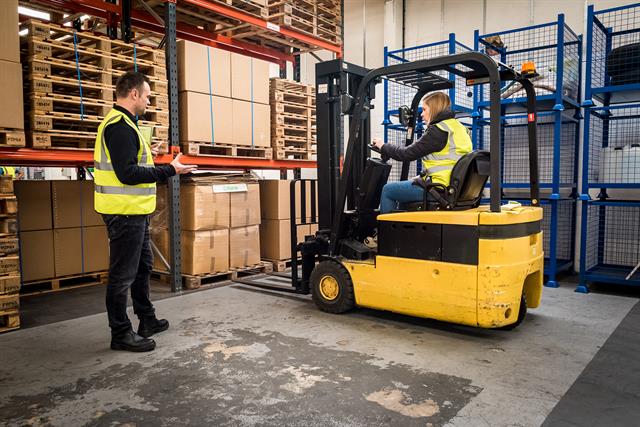 Stuart Taylor is Managing Director of Mentor FLT Training Limited, the UK’s leading training provider for all types of materials handling equipment and workplace transport.
Stuart Taylor is Managing Director of Mentor FLT Training Limited, the UK’s leading training provider for all types of materials handling equipment and workplace transport.
Regardless of industry sector, almost every business will have seasonal peaks to manage. Whether it be promotions such as Black Friday, pre-Christmas preparations or other sector-specific pressures, such upticks in demand often rely on recruitment to supplement the workforce and boost efficiency.
When taking on a new starter during a busy period, employers can be keen for a new recruit to start working productively, as soon as possible. But without ensuring that the newest member of your team is ready to start work safely, you will be putting them, those around them and your business at risk.
Indeed, research shows that workers are four times as likely to be involved in an accident during the first month of their employment than at any other time, so it’s vital that they are fully prepared before joining the ranks of your workforce.
Employers have a duty of care to all new starters, from day one. Let’s take a look at four key steps you can take to help them stay safe:
1. Verify experience and qualifications
When it comes to lift truck operators, in the UK, there’s no such thing as a forklift licence.
Any operator undergoing formal training should receive a certificate demonstrating that they have successfully completed basic training on the specified category of truck, so be sure to check their certification or proof of operation.
We strongly recommend that training is accredited by one of the accrediting bodies that form the Accredited Bodies Association for assurance of the standard of training delivered.
Take the time to check how recently the training took place and verify the details with the relevant accrediting body or training provider.
The next stage is to assess current operational skills. This will help to gauge the present standard of the operator and determine what training is required before they can safely begin using forklift trucks on your site. This can be carried out by an external provider or in-house by a qualified, competent person.
2. Provide proper training
In the UK, operators must receive three essential elements of forklift training before being allowed access to MHE (basic, job specific and familiarisation).
However, training should not be limited to forklift operators alone. New colleagues working around forklift trucks are at serious risk of injury if they are not made aware of the risks and how to navigate their new working environment safely.
Safety awareness training for anyone required to work in the vicinity of forklift trucks will ensure they understand how to help keep themselves and others safe and is therefore a good investment.
And remember, training requirements for new starters apply to everyone, regardless of contract type. Just because a worker may not be a permanent member of your team, your duty of care still applies during the time they are with you, so there’s no justification for training them any less thoroughly than your full-time, employed staff.
In the UK, the Approved Code of Practice for Rider-Operated Lift Trucks (L117) emphasises that special risk management is required when it comes to temporary workers.
So, any company that considers the time and cost of training for temporary and agency workers as wasteful or even optional, must think again.
3. Keep written records of authorisation
Once all relevant training has been completed, employers must give forklift operators written authorisation before they can use a truck. With a real risk of serious injury (or worse) resulting from forklift accidents, there’s no good argument for putting an unqualified person in control.
To prevent unauthorised access to your trucks, ensure there is a robust, communicated system when it comes to handing out keys, or consider more tech-based solutions such as PIN keypads or programmable fobs.
These not only make it far more difficult for unauthorised people to use a truck, but it also encourages individual employees to take greater responsibility for their own access credentials.
4. Regular monitoring and supervision
As well as providing training, its vital that businesses offer new starters sufficient supervision to ensure they are working safely alongside their colleagues.
Like any other employee, they should also receive consistent monitoring to ensure best practice learned in training is followed day to day and complacency or bad habits do not set in.
Having a physical presence and "walking the floor" is key, allowing managers and supervisors not only to see operating standards first-hand but also enabling key documentation, such as pre-shift inspection records to be checked.
However, other methods such as CCTV and truck telematics can also be useful tools to help identify and curb dangerous behaviour.
Whether a new starter is with you for a day or a lifetime, your investment in them will be minimal compared to the returns it can offer, including:
- Improved productivity and less downtime – studies show that safe workers are more productive workers. Fewer accidents mean less time is lost due to clean up, aisle shutdown, or out of action equipment/personnel.
- Lower damage/repair costs – skilled operators protect your bottom line as less is spent on lost stock, truck and racking repairs, new pallets, etc.
- Legal compliance – providing sufficient training will help you meet your requirements and avoid the hefty fines, court costs, and compensation associated with accidents.
- Safer staff – most important of all, you will be protecting your workforce and making sure everyone gets home safe.